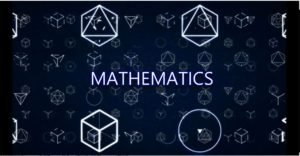
Recently, I was laying on my couch on one Hartal day and wryly decided to Google the keywords, “I hate mathematics”. I was astonished to find tens of thousands of people giving reasons justifying their hatred for the subject. At the back of my mind, I realized how naive it was to type such a phrase, when even the search engine uses the very description of mathematics to its finest detail.
In all of this, I began to question my hatred. Is mathematics really so boring, difficult and useless? What is the fun of studying functions, geometry, calculus, et cetera, when at the end we are hardly going to use them? However, I sank deeper in my couch and thought, “How and where do we use mathematics?” or “do we use it at all?”
While giving it a thought, I found myself surrounded by mathematics. For a while, everything around me presented itself in numbers and symbols. Our everyday life is based on the use of numbers. From our daily consumables to our luxury items, it is mathematics that shows us the weights or price tags. Actually, this is regarded as more of a natural phenomenon than a spill-over effect of mathematics.
Coming to a little more advanced use of this discipline, I wondered “what if there was no simple arithmetic?” Imagine, how banks would calculate the interests? How would businessmen calculate their profits and discounts? How would governments conduct surveys and draft budgets? From the scores in cricket matches and marks or grading scales in exams to the measurements pertaining to real estate and so on, we are bound to use mathematics.
The strange thing is that we employ mathematics so often that we have forgotten the degree of influence it has on us and on our world. The computer I am typing this article on came into existence because of mathematics. Earlier, it was only used to make calculations easy. Below are the observations I have made about the influence of mathematics beyond the ordinary business of life.
Mathematics and Economics
The discipline of mathematics has a profound application in the field of economics. The calculation of the GDP, budgets, taxes, resource allocations, et cetera is all but the application of mathematics. Every economics student has to study Mathematical Economics as a compulsory subject in their graduation or post graduation. Without probability, the discipline of Econometrics wouldn’t have come into existence.
Mathematics and Engineering
In my personal opinion, no other discipline can justify the use and applications of mathematics to such a finest detail as engineering can. Be it the construction of buildings, manufactureing of machines and their parts, operation of computers or even the functioning of cell phones in our hands-we find everything filtered through mathematics. While calculus finds direct applications in most areas of engineering (beam ends, earthquake analysis, fluid dynamics and so on), geometry is the core of designing in any branch of engineering.
The application of matrix theory to computer analysis, vector and 3D geometry to computer games, number theory to security systems et cetera, is striking examples of such diversified utility. Moreover, engineers use it in as diverse areas as mechatronics, artificial intelligence, intelligent transportation systems, neural networks, etc.
Mathematics as a Language
One of the most important aspects of mathematics is that it serves as the basic function of language to any physical science reader. It never occurred to me before, even while being a science student during my entire career. From the simplest to the most complex phenomenon encountered (gravity on one hand to relativity on the other), mathematics serves as a language to express the ideas in a more concise form.
Equation in physical science has an irreplaceable influence. A better understanding of complex phenomena and their subsequent explanation would not have been possible, had mathematics not been at our disposal.
Mathematics and Biological Sciences
While physical sciences and allied areas possess a natural inclination towards mathematics, it has not failed to find its place in the biological sciences. The use of mathematical modelling has found varied application in development and understanding of enzyme kinetics, cancer simulation, cellular dynamics, population genetics, and so on. Intra cellular dynamics, evolutionary biology, cancer modelling, genetic networks, molecular biology etc are some of the recent areas of research related to mathematical biology.
Mathematics, Humanities and Other Social Sciences
Don’t tell me you don’t find yourself surprised I had same thoughts about how mathematics could influence the humanities or social sciences. Well, it finds extensive application in these fields as well.
In political science, you will find mathematics in game theory. In Sociology, you will find mathematical models that study the interaction of agents of sociology. In population studies, it is mathematics that helps in predicting population changes and growth patterns, similarly in geography, map projection, topology, spatial analysis of networks can’t have any meaning without various mathematical equations. Above all, every research methodology, be it quantitative or qualitative research, can’t do away with mathematics.
Now tell me friends, after reading these innumerable benefits of the subject, can we really afford to hate mathematics?

